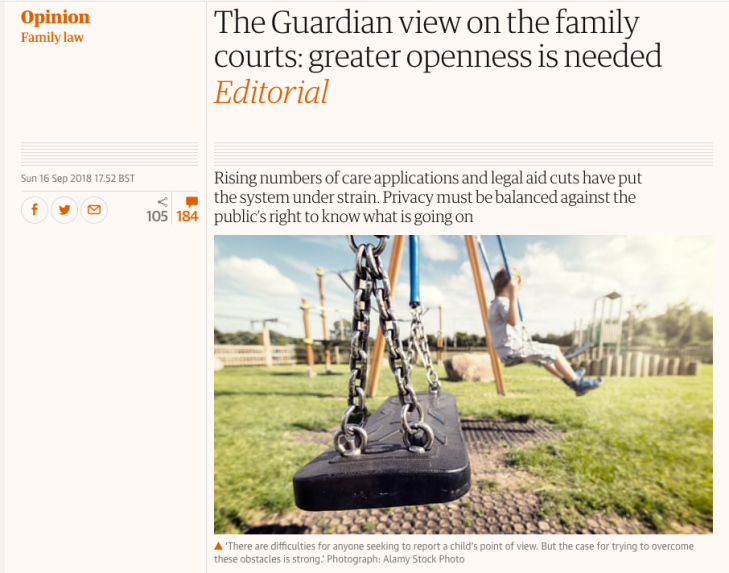It’s over a month since I published my first Open Family Court blogpost, so this is an opportunity for me to say a huge thank you to everyone who emailed in response saying you’d like to hear more and get involved.
A quick recap on the purpose of this project as I expressed it in that blog:
“[It’s planned] as a collaborative exploration of how to recalibrate the balance between privacy in family courts – which exists for the very good reason of protecting vulnerable children – and freedom of expression, which allows people to speak out publicly about what the state has done to them, a right currently hobbled by the Administration of Justice Act 1960.”
Reasons for being open
Interestingly, just last week, The Guardian published an editorial advocating greater openness in the family court.

The paper’s leader writer set the need for greater transparency and scrutiny squarely in the context of soaring numbers of children in state care, the rapid rise in applications to remove them from their families, the effects of cuts to local authority budgets, and the £2bn shortfall in the children’s services budget that directors of social services have been pleading for the government to meet. Given that preventative services have been decimated across the country, that money is vital as it would allow councils to put in more early help and family support – of which I keep hearing there is all but none to be had.
The editorial concluded:
“Openness should enable, and not hinder, good practice. If people are to have views on legal aid, or adoption, or the impact of cuts, they need to know how the system works. Before the crisis in the family courts can be tackled, means must be devised for it to be seen.”
I think that’s right. We cannot, as citizens, have an informed view on what is done in our name, in a legal arena where some of the most drastic intrusions possible are visited upon families by the state, if we are not allowed to understand how that system works in practice.
Want to get involved?
There are several ways you can contribute to the thinking I want to generate through this project, and I’d be thrilled if you wanted to take part.
1 – Chat to me on Twitter on @openfamilycourt. I’m taking notes of people’s thoughts, arguments and concerns, which will inform the project as it progresses.
2 – Would you like to write a blogpost in response to the aims of this project? Let me know on openfamilycourt@gmail.com
3 – My intention is that there will be two workshops before Christmas. These are intended to draw out and draw on people’s expertise, ideas and experiences in order to address the conundrum of how do we get to a place where there is better accountability, scrutiny and openness in our system of family law – in a way that children stay safe.
To prepare for these workshops (there will be at least two in the New Year as well) I recently undertook a fascinating training session with facilitator Helene Jewell on how to run a session where some really deep, exploratory thinking can be done, and hopefully some radical, creative, disruptive ideas can be generated.
I’ve not done formal facilitation before, so this is a learning curve for me; I’ll do my best.
I would love each workshop to include a mix of: family members (including of course care leavers and anyone who as a child experienced the family courts) with experience of either private law or public law cases; social workers: family lawyers; academics; journalists; and charities with a relevant interest and expertise.
It might be possible to include the views of children over the age of 16, and I am still looking into how this might be done, as well as taking advice on whether I should.
If you’d like to be involved in the facilitated workshop sessions, which are the backbone of this project, please email me on openfamilycourt@gmail.com
Once I’ve organised the dates, I’ll be emailing people who say they want to attend a workshop with an online calendar to see who might be able to get to which venue (I’m aiming to hold them in different areas of the country).
Related news on family law issues
Just in case of interest, (not directly related to the Open Family Court project), in the last two weeks, I’ve written two Guardian pieces looking at different aspects of the care system.
The first was a news report on research by Professor Andy Bilson, which analysed statistics on the use of “emotional harm, or risk of emotional harm” as a reason for child protection plans across the country, and found that nationally, numbers have risen very sharply.
By contrast, sexual or physical abuse as a reason for launching child protection plans had risen only marginally. It was particularly notable that in some areas, the use of “emotional harm” as a reason for child protection intervention had risen fast, while in others, it had gone up only a little, and in others, it had fallen.
The second piece was a longer feature on the latest findings from a long-term study led by Professor Paul Bywaters across England, Scotland, Wales and Northern Ireland. The research showed that the rates at which children are living in foster or residential care are markedly different in the four areas: Northern Ireland has 35 children in foster or residential care for every 10,000 children, compared to 82 per 10,000 in Scotland, 62 per 10,000 in Wales and 52 per 10,000 in England. Those differences are huge, and the team is currently exploring why they might occur.
Reblogged this on Peace Not Pas and commented:
Louise Tickle’s second blogpost of her Open Family Court project. Thanks Louise for raising awareness of the issues that are caused by an overly private Family.
#FamilyCourt
#ParentalAlienation
LikeLike